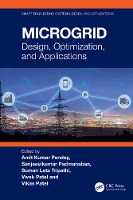Amit Kumar Pandey completed his PhD in microelectronics and VLSI from MNNIT Allahabad. He earned his MTech from NIT Allahabad and BE in Electronics Engineering from Swami Ramanand Teerth Marathwada University Nanded. He has been an assistant professor at Rajkiya Engineering College, Ambedkar Nagar for the last four years and has twelve years teaching experience. He has published more than thirty research papers in referred journals such as Springer, Wiley, Emerald, among others. He has also published three patents. His areas of expertise include microelectronics device modeling and characterization, low power VLSI circuit design and VLSI design of testing.
Sanjeevikumar Padmanaban, PhD, is a Full Professor of Electrical Power Engineering in the Department of Electrical Engineering, IT and Cybernetics, University of South-Eastern Norway. He has authored 600 plus scientific papers, and is a fellow of the Institution of Engineering and Technology (UK).
Suman Lata Tripathi completed her PhD in microelectronics and VLSI from MNNIT, Allahabad. She completed her post-doc from the Nottingham Trent University, UK in 2023. She is associated with Lovely Professional University as a professor with more than twenty-two years of experience in academics. She has published more than 125 research papers She received the "Research Excellence Award" in 2019 and "Research Appreciation Award" in 2020, 2021, and 2023 at Lovely Professional University, India. Her areas of expertise include microelectronics device modeling and characterization, low power VLSI circuit design, VLSI design of testing, and advanced FET design for IoT, Embedded System Design and biomedical applications.
Vivek Patel is an assistant professor in the Department of Electrical Engineering, faculty of Engineering & Technology, Dr. Shakuntala Mishra National Rehabilitation University Lucknow, India. He graduated from Ideal Institute of Technology, Ghaziabad, India and completed his post-graduation with hons. degree in Power System Engineering specialization in the Department of Electrical Engineering from IIT (ISM) Dhanbad, India. He has authored numerous SCIE, Scopus and pear reviewed research papers in refereed journals such as IEEE, Springer, Elsevier and at conference proceeding. He was also granted two international patents. He received the best paper award at NPSC. His areas of research are power systems and control.
Vikas Patel is pursuing his PhD in Renewable energy from MMMUT, Gorakhpur. He graduated from Ideal Institute of Technology, Ghaziabad, India and completed his post-graduation with hons. degree in Power Electronics and Drives specialization in the Department of Electrical Engineering from Madan Mohan Malaviya University of Technology, Gorakhpur, India. He is currently an assistant professor in the Department of Electrical Engineering, Rajkiya Engineering College Ambedkar Nagar, India. He has more than seven years of experience in academics and research. His areas of expertise include power electronics modeling and characterization, renewable energy, optimization, IoT, and embedded system design.

